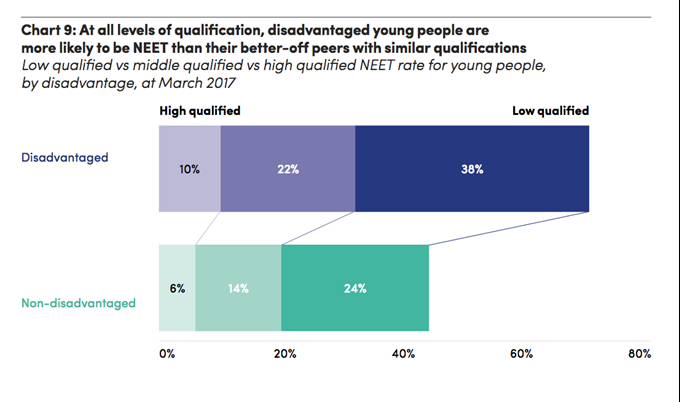Well-qualified young people held back by disadvantage, study finds
Nina Jacobs
Wednesday, April 24, 2019
Disadvantaged young people are twice as likely to be not in education, employment or training (Neet) in early adulthood - and inequalities remain even if they are qualified to the same level as their more privileged peers, according to a study published today.

The Establishing the Employment Gap report finds that 26 per cent of disadvantaged young people eligible for free schools meals were Neet after leaving school, compared with 13 per cent of those who were not eligible.
Qualifications are a key determiner of life chances, but the study found that even if these are the same, those who are disadvantaged are twice as likely to end up Neet than those from higher socioeconomic backgrounds.
The report claims that while previous studies have found a similar gap, the new analysis uncovers an additional 78,000 additional disadvantaged young people aged between 18 and 24 ending up Neet.
The study, published by charity Impetus, with the National Institute of Economic and Social Research and the Centre for Vocational Education Research, draws on new longitudinal educational outcomes data from the Department for Education, on the impact of young people's life chances after growing up in disadvantaged families.
The report analyses six cohorts of students who sat their GCSEs in the same year from 2007 to 2017, and tracked their progress after leaving compulsory education.

Source: Establishing the Employment Gap
The analysis also highlights significant regional differences affecting the life chances of disadvantaged young people: those growing up in the North East are 50 per cent more likely to end up Neet than a disadvantaged young person in London.
The research suggests lowering the national Neet rate for disadvantaged young people (26 per cent) to the London rate (21 per cent) would result in 22,000 fewer disadvantaged Neet young people overall.
Figures for Manchester shows it has among the highest Neet rates for non-disadvantaged young people (18 per cent) while the corresponding rate for the disadvantaged group was in line with the regional average (28 per cent).
Cumbria has among the smallest Neet rates for non-disadvantaged young people (11 per cent), also have a 28 per cent Neet rate for disadvantaged young people.
The study found that educational attainment is not sufficient to explain the reasons why disadvantaged young people are more likely to be Neet than their better-off peers.
"Looking at the Neet rates by both disadvantage and qualification, we see that disadvantaged young people are still more likely to be Neet than their similarly qualified but non-disadvantaged peers," the report said.
The longitudinal educational outcomes data shows this finding to be the same in every region across the whole time period analysed for the study.
"This is a stark and surprising finding - disadvantaged young people are around 50 per cent more likely to be Neet than their similarly qualified but better-off peers, regardless of whether they are high-, middle- or low-qualified," the report added.
Stefan Speckesser, associate research director at the National Institute of Economic and Social Research, said the findings confirmed the importance of educational success, adding that the new data also shows that "family disadvantage and where people live also have immense influence, irrespective of qualifications".
He added that he hoped future work would reveal more about the "complex interplay of locality, family disadvantage and education" to help "improve policy and programmes for young people".
Impetus works with other charities across the UK to help provide high-quality employment support for young people who are Neet.
Andy Ratcliffe, Impetus chief executive officer, said the data showed that "for young people from disadvantaged backgrounds, this is not a good news story".
"We are breaking a fundamental promise to young people in this country," he added.
"We tell them: ‘study hard, get your qualifications and good jobs will follow'.
"For many young people this is true. But for young people from disadvantaged backgrounds it isn't.
"They are less likely to get those qualifications, and even when they do, less likely to benefit."




